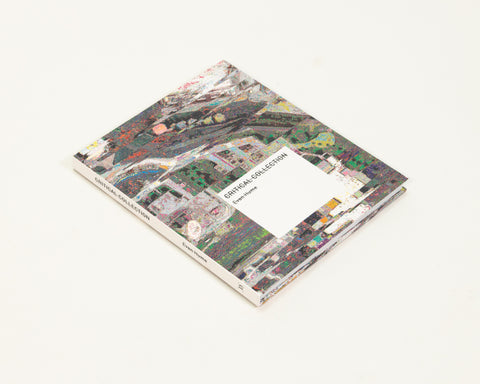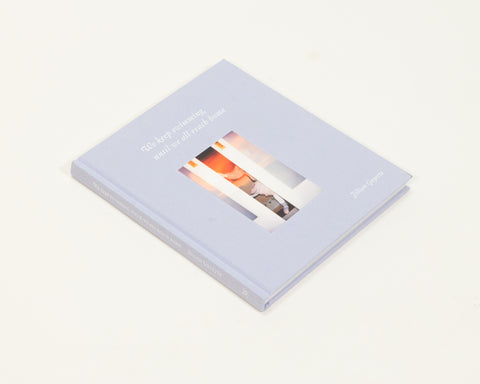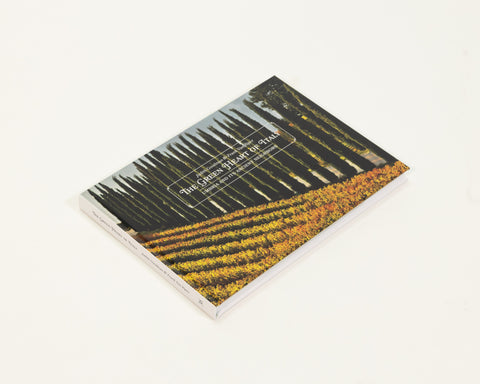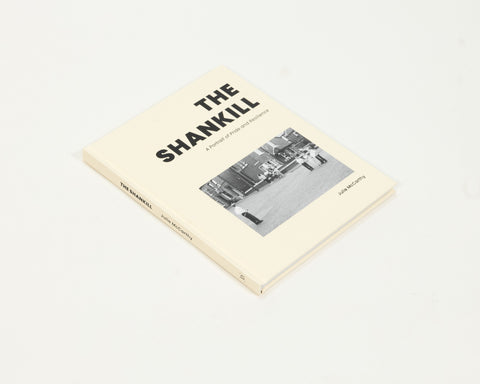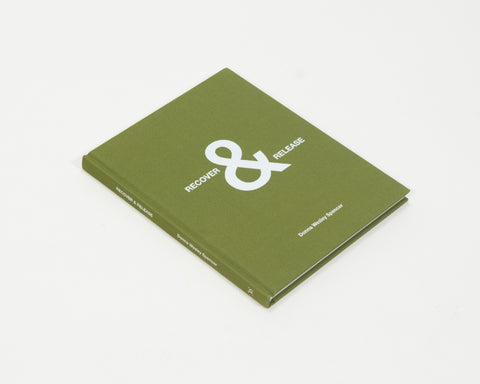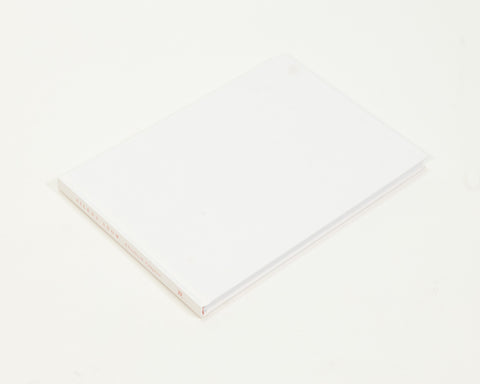Kate Levy sat down with Baldomero Fernandez at the noisy Pain Quotidien. Kate ate salmon, Baldomero ate pastry, and they casually meandered through conversation. For more information on the Photo Awards, click here: http://www.daylightmagazine.org/content/daylight-photo-awards
Baldomero Fernandez: So I just did my first video documentary piece, for a very well known fashion designer who is really into boxing, the piece is about transcendence through boxing. He's the last person you might expect to box!
Kate Levy: So we can start off by talking about irony then. Irony kinda translates differently in video than in photo. You can make these interesting obscure connections in photographs, that you might have to work harder to make in a video. Boxing gloves hanging next to a nice silk shirt maybe. Easy. But, in a video, sometimes you can make connections more easily between text and image, than you could with written words and still photographs.
BF: You can look at photographs for a really long time, or you can look at them for a split second and get everything out of them. With video, your attention span isn't always there. You'll see beautiful images but there is so much going on you don't have time to see everything.
KL: You can't sit with it for the same amount of time--or rather, you can't set the pace for how long you get to look at an element of the imagery.
BF: That's whats interesting about stills, you get everything so immediately, but you also spend time.
KL: Being able to engage someone enough in a video to have them pick up the details they all ready have access to in your photography. You can structure a photograph where people can look longer and longer and get more out of it, but when you structure a video, you must do that over time, rather than in space.
BF: I really enjoy it. Its definitely separate from still photography; I wouldn't go into a project that I am all ready doing still for and try to do a video. I think they would both suffer then. I think you have to really focus your efforts on one or the other.
KL: So how long have you been working on Middletown?
BF: I started in 2009, when shit hit the fan with the economy. I haven't worked on it for about a year. Lately, I've had a hankering to go back and keep shooting. You start seeing little things in life, you drive past, and you really want to stop. You see these things happening. That's how I've always approached the project. With the exception of a couple times, I've never really gone out to find these photographs. You find them going to place to place.
KL: You didn't focus your efforts on any particular location?
BF: I did one trip, with a friend of mine. We went to central Pennsylvania. He was like, "Oh you have to go visit where I am from; it's like a set for your images." We took a day trip. It was nice to go drive around and explore somewhere I've never been. We went to his town, and I was kinda, "Eh, its okay," but on the way back driving, we found all this other stuff. Two or three of the photos in the series came out of that drive.
KL: Which ones?
BF: The deer hunters.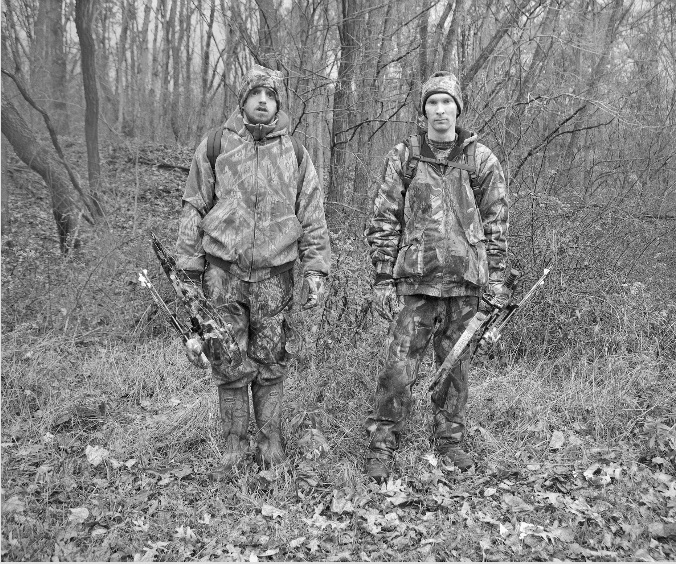
Copyright Baldomero Fernandez, Deer Hunters
KL: That guy's mouth in that one...
BF: They were interesting. I saw them walking down the side of the road. It was a little rural country road, and I was like, "Oh my god," and my friend was like, "Are you sure you wanna..." and then I literally jumped out of the car. I think they were more scared of me than I was of them. It wasn't that until I snapped a few pictures and spent a few minutes with them that I realized they hadn't hunted anything.
KL: What was the most extensive amount of interaction you had with your subjects, throughout the process of compiling the work?
BF: It was all fairly short, transient interactions. The longest I spent was lunch with this older lady, her name is Delphine. I had lunch with her. Pretty much everything else was just minutes.
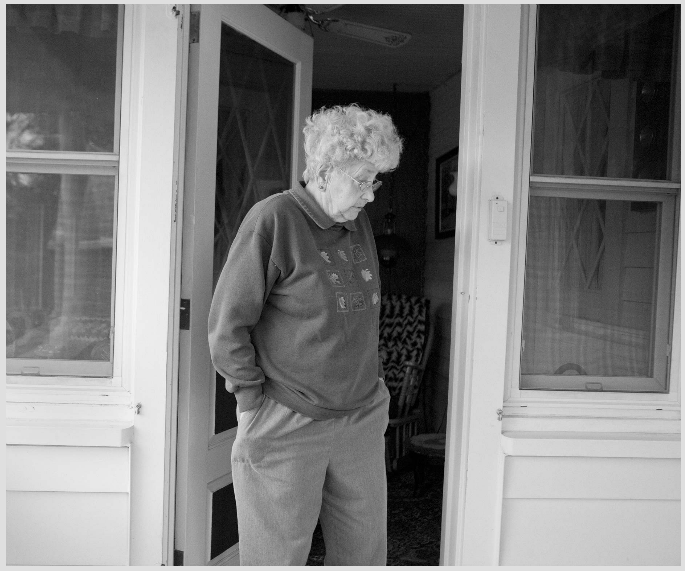
Copyright Baldomero Fernandez, Delphine
KL: That’s something that I ask a lot of people when I interview them. To what extent to you interact with your subjects. I think its an interesting question. And I think transience, and experiencing a larger mass of land, or place, or idea that runs through American Existance, photographically, without having to delve into specifics with people can be really liberating. I think its different when you are focusing on one place and you don’t get to know the people. Your work seems to be about the idiosyncracies of depressed America.
BF: Part of what I enjoy about the whole transient thing, whether I’m photographing a person or landscape, is you get to focus on the gut reaction. You aren’t overthinking, overanalyzing.
KL: Working from a feeling, rather than a lot of information that you are trying to illustrate. Did you ever become frustrated with it being such a transient subject based on an idea?
BF: No, no. I think what frustrated me sometimes was seeing it, feeling it in a place and not being able to photograph it.
KL: Any photographs you can remember that you would have liked to make but couldn’t for whatever reason?
BF: They usually tend to be somewhere there is a moment that you see driving by, and you turn around. When you go back its not there.
KL: or you see a certain way...
BF: It would be great to have a video camera set up and be able to pull out amazing stills. The whole project shot from your car window
KL: That would be really interesting. Sometimes the car window frames something in a way, and you think that its framing it the way your camera would, and its actually not at all representative of what the camera would get.
BF: Sometimes I got really lucky. I turned around and got to the spot, and what I was able to capture was better than what I originally saw. The one where those guys are burning their house apart. I saw all this smoke and through there was a house fire. I turn around and realize these guys, every day after work, would take parts of their house, put it in this big dumpster and burn it. And I came up and asked, “Can I take pictures of you guys?” And they replied, “You don’t work for the government, do you?”
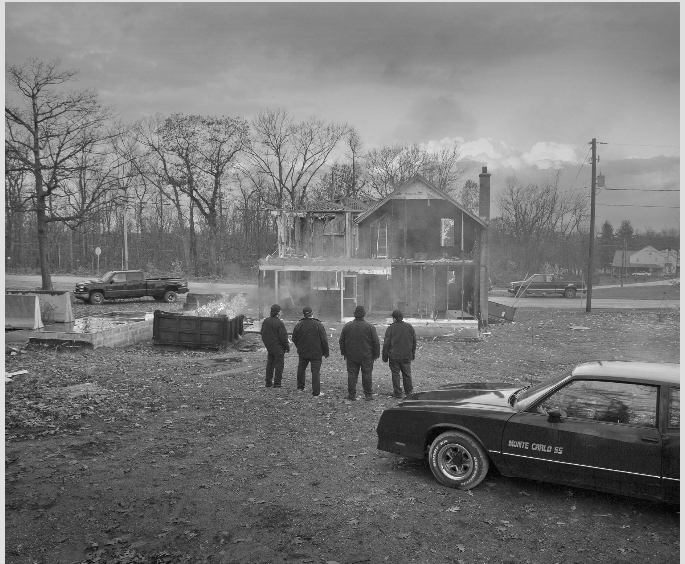
Copyright Baldomero Fernandez, Burning Down The House
KL: Wow.
BF: I shot it from all these different angles, and I was able to explore, and I couldn’t had I just jumped out.
KL: Are you working towards a book at all?
BF: It would be nice, but that would be more of a vanity thing, I think. I don’t know what the purpose of having a book would be, other than saying, “Oh, I’ve got a book.” Photobook are great, beautiful, but its not a burning desire I have. I think maybe ten years from now if I had a huge amount of work I could distill into something really strong that spoke about a moment in time in our history..maybe then it could..
KL: Then it could be justified...
BF: Yeah, so often, people are putting photo books out, its easy, cheap to publish your own book. There are so many publishing companies. Everyone is putting a book out without much thought. While there are certainly so many beautiful photo books out there, there are so many people are just putting out to say, I have a photo book.
KL: It makes sense to make a book though, rather than huge prints, as that can cost more than producing a book, and you can disseminate it to more people. But I get that it is kind of counterintuitive to make this big elaborate book on something that talks about the crumbling of the economy.
BF: Right.
KL: When we first started talking, you said the project was in response to the economy, but, it made me wonder, was it because you werent getting as much work and needed to shoot or...
BF: A little bit of both--the work I was getting started to change, I ended up getting a client taking me to small towns in the middle part of the country, and we’re in these big Walmart warehouses, and I was like “God, this is the reality of the country.” I think I might have been really depressed at the time. Who knows. I didn’t want to just shoot it. I’ve always shot color, but I didn’t know how color would work. I thought of all these WPA photographers. I was paying homage to them by shooting black and white.
KL: Did you see the photo league show at the Jewish Museum?
BF: No.
KL: Oh Man. Bummer. There were some striking simialrities..and I think they tried to draw some parallels, between the conditions now. But how did you find that experience, in a world, especially in middle America, where you are getting infiltrated with imagery, like on billboards. Even if there is no sign of civilization for like 600 miles, you'll still have bilboards with images every mile. How did you reconcile that with making analog, black and white photographs?
BF: Well-- I was shooting digital.
KL: Ha!
BF: I think the photographs actually reconcile that for me. Just making them. I mean, I did photograph some of those billboards. But I also ignored that. I don’t photograph everything. What I love about the camera is that you have to take things out of the frame. I left a lot of stuff out. Lately, I’ve been thinking of focusing on that instead.
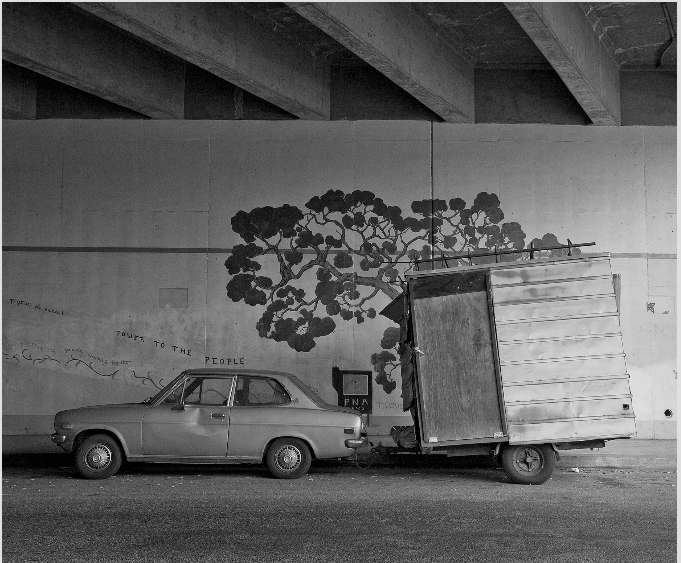
Copyright Baldomero Fernandez, Mobile Home
KL: But did you feel like--and maybe this is me projecting my own experience of the analog, or of documentary photography--having been informed so much from the photography of the great depression, does it frustrate you--you aren’t publishign a book, and you have such a great relationships with taking photographs, but, is there--do you find frustration in the procces of making photographs like the FSA was making in today's image saturated climate. Like they won't hold their ground?
BF: No, I don’t find it frustrating. I always made these photographs for me. It was never about anything else but making the photograph, to release my frustration. Even if no one ever saw them. It wasn’t about that. I think there is something really cathartic about being able to capture your feelings. You let it go at that point.
People have seen it, responded well, and that in itself is validation.
KL: Getting it out.
BF: Not to say i’ve gotten it all out
KL: Thats why we keep making images. Has the work informed how you work comercially?
BF: Not visually. Mentally maybe. You show up for shooting these ridiculous shoots, and its hard to reconcile. What am i really doing? I realize I'm not doing any thing that is that important, so i don’t stress over these photo shoots. It's just work, like these guys working on the line, its just a job, and makes me feel better about it actually.
KL: It's strange to use the same thing to do something you could give a shit less about as you do for your outlet. Your connection to the things you are really trying to understand. Do you use the same setup for both?
BF: For the most part, the commercial stuff is lit, and there's a huge production.
KL:It's amazing how many rolls one thing can fill.
BF: Not to say that I don't enjoy going to a studio and having a catered lunch. The documentary hasn’t informed me, but it makes me not take it so seriously, and enjoy it more.
KL: Have any people you’ve shot for Middletown seen the photographs?
BF: I've sent a few, but I don’t keep in touch.
KL: I read your artist stamenet. Your writing is really great about the situation of the US. There are some beautiful metaphors..the woman who puts the rose in the refrigerator to make it last a couple days longer.
BF: I hate writing. That statement took me so long to write. Especially artist statements. I had to talk to a lot of people. I talked to Sasha Wolf and Michael Foley. They were really helpful with my artist statement. Talking about it helped me write it
KL: It's totally hard, to say something the photographs don’t say...The fact that those guys were buring their house down for insurance.
BF: If you own a piece of land with a house, they charge you taxes for having a house on it. Burning it down takes care of it. Rather than refurbishing, or cleaning it up and selling it.
KL: Its a perfect example of people taking things into their own hands.
BF: I think its a good metaphor for America. You used to fix things, now its easier to just burn it down.
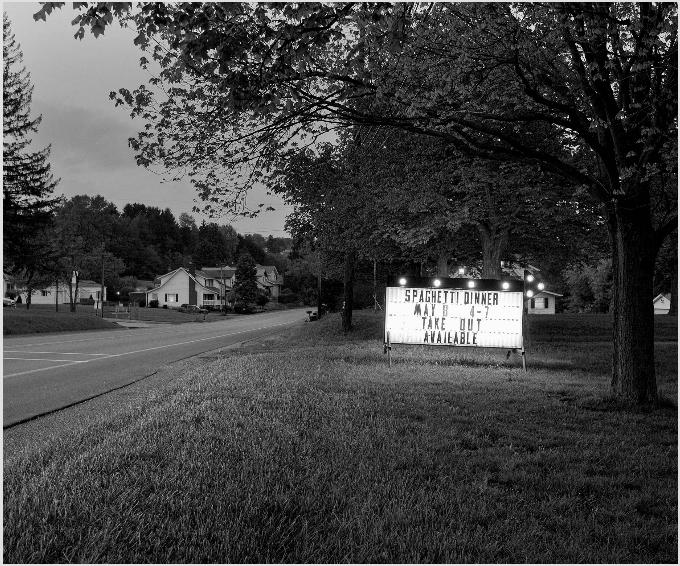
Copyright Baldomero Fernandez, Spaghetti Dinner
KL: I wonder what is more effective--individuals burning their houses down or a bunch of hippies sitting in a park?
BF: Probably both equally effective.
KL: Whats the most valuable piece of insight into your subject matters?
BF: Nothing revelatory, the heavens opening up. But, I think people used to think America was going to get better and better and better. I think people have lost that faith. I hadn’t lost faith before I started the project. I’m an optimist. Seeing that, seeing that people don’t think that anymore, that we could be on the up.
KL: Do you feel like you have gained a connection to a populous, working for yourself in New York City you aren’t part of on a day to day basis?
BF: Maybe. I hadn’t really thought about it. I never...I spent a lot of time in upstate NY in a camper, so I felt like I understood being in small town America. So I don’t think I feel any closer to it now.
KL: It's a big sweeping assumption to make that all photographers have always lived in NYC.
BF: I know photographers, when they go out, they make fun of the locals. Not to say that I don’t view my subjects from the standpoint of a New Yorker. But you try not to judge or make assumptions.
KL: It comes through in the photos that you are trying not to judge. There is a relaxed relationship between you and your subjects. How does the camera help or hinder you in that?
BF: I think when you approach someone with a camera, the initial fear is that they will be somewhat standoffish. But a camera gives you a reason to be there. Its an introduction. Its okay. You can almost hide. But sometimes when you are just walking down the street you stand out more. If you have a camera, they assume you are just taking pictures. I say I am doing a project on small town America. It helps to tell the truth.
KL: Do people ever take offense that you have pinpointed them as an ideal subject for a project on middle America?
BF: No one has ever taken offense, but they ask, “Why do you want to take a picture of me?” It's a natural question. So I say, “Oh the scene is really nice..”
KL: Do you ever not ask permission?
BF: If I can get away with it.
K: What about those boys sitting at the diner?
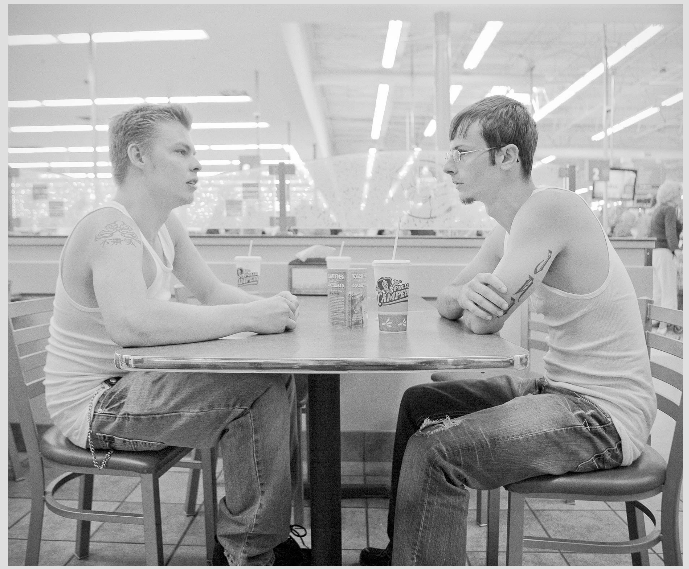
Copyright Baldomero Fernandez, The Conversation
BF: That was inside of a Walmart in Arkansas. I was there on a job for Walmart. I spent 14 hours in that store.
KL: You actually worked for Walmart??
BF: Yeah, I was there on a commercial shoot. Those were out takes I didnt show Walmart, but I just happened to be there. There was this little fried chicken place inside of Walmart and I was like, “You are kidding me, this is perfect."
KL: They look so engrossed in conversation with eachother.
BF: They were. I sat back in the booth, snapped a couple pictures, then I approached them and asked if I could take a picture. They said, “Yeah, sure” and then I kept shooting. I told them to keep going back to what they were doing. After 3-4 clicks, I think they just kind of forgot.
KL: Did you conceptualize of Middltown in the beginning phrases, or in sequencing?
BF: I was shooting the photograph for a while. I had a handful, and I was like, “These are really nice, I like whats going on here." I sat down, figured out why I like them so much. Then I kept shooting in that vein, looking for those things.
KL: I'd be interested in seeing the photographs for Walmart's purposes. Anything new you are working on?
BF: I’ve been working on some landscapes on the Hudson, and then some of my kids, but they kind of suck.
KL: I think its important for people to make shitty work.. something happens. But then again, I'm in grad school.
BF: There's something there I like, but I think it's because they are my children, not for any other reason.
KL: You have kids.
BF: I have a four year old.
KL: Have you seen the project Oculus by Ken Schles. It's interesting, there's an impulse for photographers who are women to make picures of their children at times. I feel like guys might be starting to get on that too.. Ken Schles, Alec Soth.
BF: I am probably generalizing. Mothers photograph their children and have a totally different relationship than fathers do. I think, maybe this is just me, but I always end up making photographs of my son that i know my wife or mom will like, rather than photographs i want to take. So I end up with these cute pictures, but they dont have the same depth as the photos Elinor Carucci or Sally Mann would make.
KL: Elinor takes them how she sees her kids, you take them how your wife sees them.
BF: Funny.
KL: Have you tried taking pictures how you want to?
BF: No. He's almost five, it's taken me this long to, so think I should. I never really thought about it. I never shoot him in a documentary fashion.
KL: I think that would be really challenging, the impulse could be to go back to that aesthetic of children's photography that might be more informed by how a woman might see her child. Most of the imagery that has to do with children, that is of the documentary fine art nature is made by women, so I’d imagine that decolonizing your mind from the institutionalized aesthetic of how children are supposed to be looked at by a camera, would be an interesting and difficult process.
BF: Not difficult. It's just a matter of shooting without filters. Sometimes I take a picture that is just for me, but then its very romantic, this, this is my son, we're at the beach, with a beautiful sunset. Just him and me. But never..
KL: Revealing of your more complex feelings
BF: I dont think guys think that way about their sons. If they do, they'd never tell anybody. Men look at their wives and girlfriends as sexualized. You dont do that with your kids. Going back to the filter, I don’t know what filter you put on your kid you'd be willing to share with the world.
KL: Maybe, as a generalization, women feel their child is more a mirror of them...I don't know though.
BF: Mothers carry the children's cells in their bodies until they die, cells that help mothers fight off diseases. Men will never have that. The man’s connection is different. Its not that its not as emotionally strong, but it's just not the same. Something to think about.
To see more of Fernandez's bodies of work, visit http://baldomerofernandez.com/
